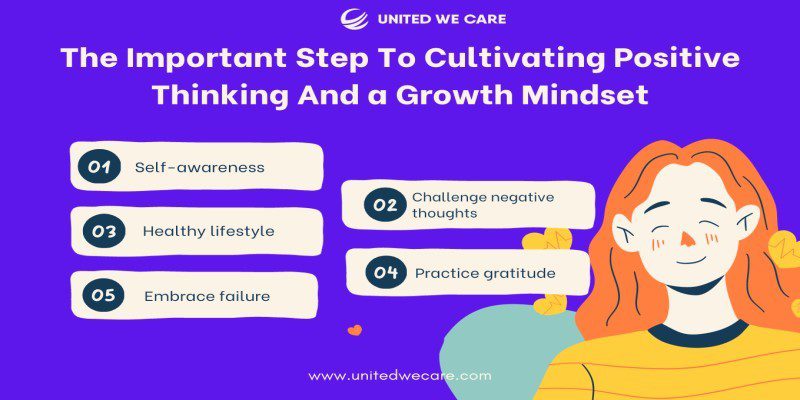Introduction
Is it possible to be cheerful when life is less than ideal or fair? Probably not. But is it possible to look at the silver lining and learn during those times?
Absolutely. That’s the beauty of practicing positive thinking and having a growth mindset.
Thinking positively does not mean we create a falsely positive facade and ignore or discard our difficult emotions.
It means we accept and process them so that we are able to look beyond the unpleasantness of the situation and grow from it.
Positive thinking may not always come naturally to us. But that does not mean we’re pessimistic. Cultivating a positive outlook in life goes hand-in-hand with having a growth mindset.
A growth mindset believes that we can develop and improve our skills and abilities, such as positive thinking, with dedication and practice.
By intentionally shifting our mindset towards positivity and growth, we can unlock the doors to a life filled with resilience, fulfillment, and happiness.
What are positive thinking and growth mindset?
Imagine this: you have to finish a task, personal or at work, but you’re just not able to. You keep thinking you’re going to be terrible at it or, even worse, fail at doing it. Even with the little bit of progress you make on it, you reject it, thinking it’s nowhere near the standard you have previously set.
The more you think about it, the more you put off doing what needs to be done. You drive yourself into a negative downward spiral. At this point, you’re scared of not being perfect, failing, and becoming a laughing stock.
Now, you have two options, although one of them might not seem that obvious at the moment.
Option 1:
You let the negative thoughts and emotions consume you, so much so that you self-fulfill your prophecy of failing at doing the task altogether. You’re left feeling even more terrible about yourself and your capabilities.
Option 2:
You begin acknowledging your feelings of frustration and disappointment. You be kind to yourself and gently pull yourself out of the downward spiral. You take the pressure off yourself to be perfect and do not look at failure as the end. You remind yourself that it is okay to have a setback and that it does not define you as a whole. You get yourself to finish the task as best as you can.
If you choose to go with the second option, you can say you are on the path of positive thinking and growth.
It is important to understand that thinking positively does not mean we force ourselves to have positive emotions about a challenging situation. [1] It means that we are realistic about what we feel and make a conscious choice to look beyond the crisis. It means we try to make the most of an obstacle and see the best in ourselves and others.
Even if you identify more with the first option, you can turn things around for yourself with a growth mindset.
Having a growth mindset means that you do not think in absolutes and are flexible in dealing with challenges. You dedicatedly work through them and get out stronger rather than feeling threatened and defeated.
Benefits of positive thinking and growth mindset
Do you know positive thinking and having a growth mindset which can impact our mental health and wellness in surprising ways, such as:
- Increased physical well-being: Various research studies have been conducted on the relationship between our thoughts, mindset, and physiological health. We now know that optimists have a stronger immune response [2], reduced risk of cardiovascular diseases [3], and a longer lifespan than pessimists.
- Better mental health: With positive thinking and a growth mindset, we are at a lower risk of depression [4] and anxiety. If we have positive thinking and a growth mindset, Our ability to adapt to change and solve problems also increases.
- Reduced stress: When we think positively, we are able to stop dwelling on what’s not working out or can’t be changed and look for alternative solutions to move forward. With a growth mindset, we learn to treat challenges as stepping stones for our personal development.
- Greater motivation and achievement: When we focus on growth and improvement, we are more motivated to set goals, work diligently towards them, and achieve success.
- Enhanced resilience: If we have to cope with problems with strength and, an attitude of resolution helps improve our overall well-being. With positive thinking and a growth mindset, we are able to be hopeful, ask for support, and eventually bounce back from setbacks.
Important steps to cultivate positive thinking and a growth mindset
Suppose we practice and have good intentions; an attitude of positivity and growth can be cultivated and enhanced. We can take some essential steps that help to develop these powerful attitudes:

- Self-awareness: Are your thought patterns and beliefs predominantly positive or negative? Examining this can help us recognize where we stand and what kind of changes we need to make to serve us better.
- Challenge negative thoughts: We can practice with ourselves. This is a simple CBT exercise. When we find ourselves in negative thought patterns, we ask ourselves whether these thoughts stem from facts or mere assumptions. If it’s the latter, we must reframe them to positive and constructive perspectives.
- Healthy lifestyle: We should follow a healthy lifestyle, get good sleep, eat nourishing food, and get exercise for a better mindset.
- Practice gratitude: When we express gratitude towards the people, we feel more optimistic. A gratitude journal is an effective tool for this practice. [5]
- Embrace failure as learning, set realistic goals, reevaluate them as needed, and value the process over the end goal or result.
In conclusion
Moreover, we should have a positive outlook on life. We process our difficult emotions and find alternative ways to navigate through the challenges for wellbeing. If we have a growth mindset, it encourages us to evolve our skills and capabilities with hard work and determination.
So, we practice positive thinking and having a growth mindset, both of which are essential for our well-being. Whenever we implement these attitudes in our daily lives, we shall get better physical and mental health, which reduces stress, increases motivation and achievement, and enhances resilience and life satisfaction.
While these attitudes may not always come naturally to us, they can be cultivated with self-awareness, reframing negative thoughts, following a healthy lifestyle, practicing gratitude, and embracing setbacks as learning experiences.
References:
[1] Shonna Waters, PhD, “The Benefits of Positive Thinking,” BetterUp, https://www.betterup.com/blog/positive-thinking-benefits. [Accessed: Oct. 05, 2023].
[2] Suzanne C. Segerstrom, “Optimistic Expectancies and Cell-Mediated Immunity: The Role of Positive Affect,” Psychological Science, vol. 21, https://journals.sagepub.com/doi/10.1177/0956797610362061. [Accessed: Oct 05, 2023].
[3] Julia K. Boehm, “The heart’s content: the association between positive psychological well-being and cardiovascular health,” National Library of Medicine, https://pubmed.ncbi.nlm.nih.gov/22506752/. [Accessed: Oct. 05, 2023].
[4] H. Achat, “Optimism and depression as predictors of physical and mental health functioning: the Normative Aging Study” Bulletin of Psychology and the Arts, vol. 1, https://pubmed.ncbi.nlm.nih.gov/10962705/. [Accessed: Oct. 05, 2023].
[5] Kendra Cherry, MSEd, “What Is Positive Thinking?,” Verywell Mind, https://www.verywellmind.com/what-is-positive-thinking-2794772#citation-10. [Accessed: Oct. 05, 2023].










